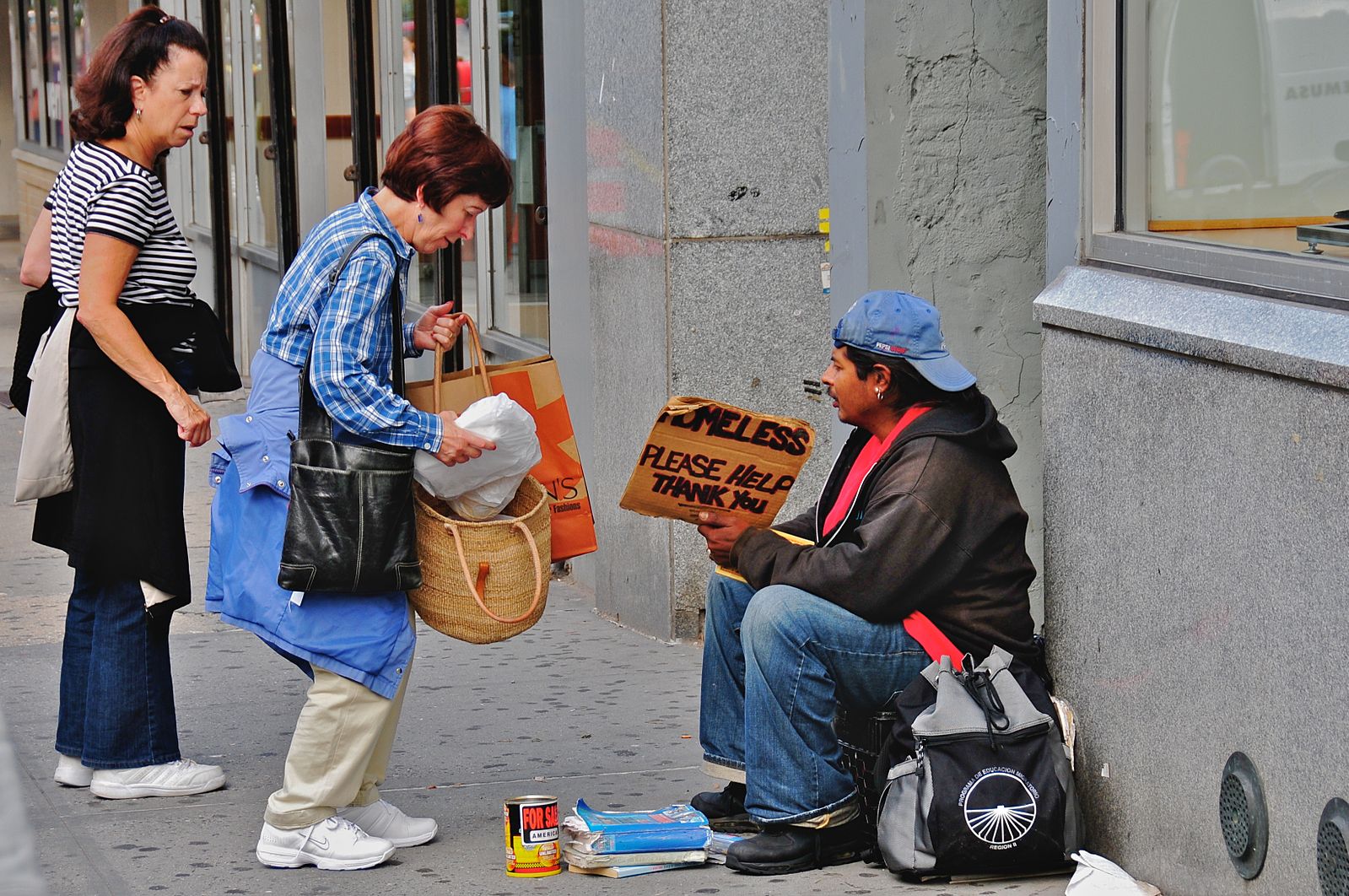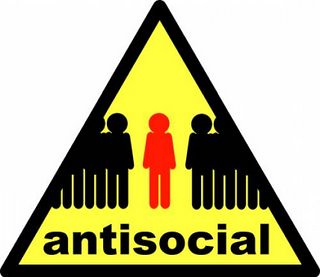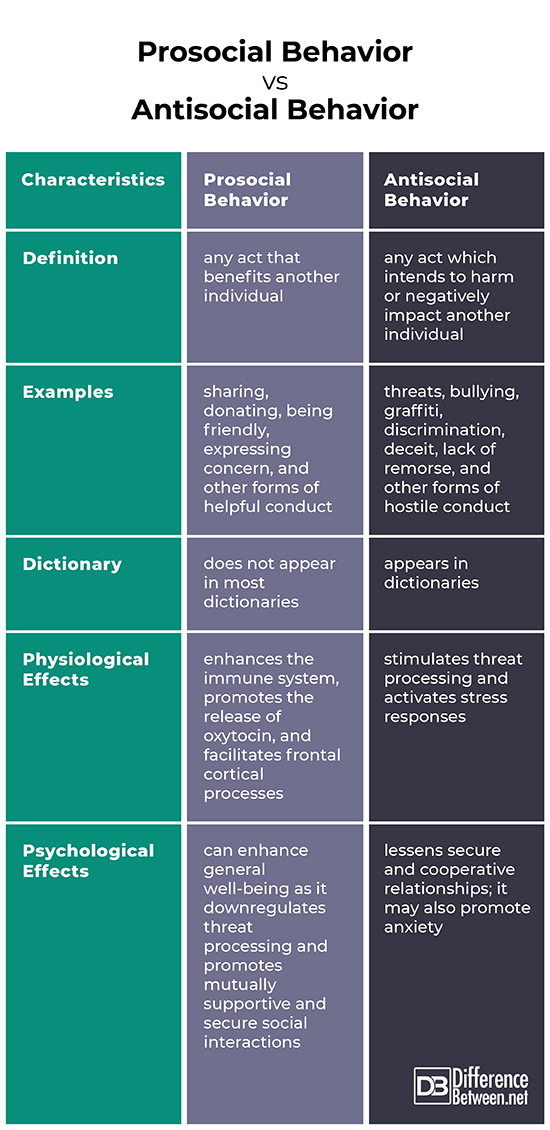Difference Between Prosocial Behavior and Antisocial Behavior
Prosocial and antisocial behavior are psychological terms which may be explained by evolutionary and social learning theories as they may be both necessary for survival and may be learned through imitation. The development of such behaviors may also be influenced by family history, peer groups, school environment, and genetics. In addition, prosocial and antisocial acts are exhibited by both humans and animals.
Regarding their general distinction, prosocial behavior benefits others while antisocial behavior negatively impacts others; hence, the former is largely endorsed than the latter. The following discussions specify their differences.

What is Prosocial Behavior?
The term “prosocial” does not appear in most dictionaries. It was coined by social scientists as the opposite of “antisocial” (Batson, 2012). Generally, prosocial behavior refers to any action that benefits another individual. These voluntary actions which aim to help others, are vital social acts. They are essential in nurturing positive relationships and social adjustment (Dovidio, 2006). Moreover, prosocial conduct is defined as empathetic or compassionate behavior. For this to occur, a benefactor and at least one recipient are required. For instance, we donate money to our respective charities and we often do favors for friends, family, and even strangers.
Regarding its roots, experts believe that prosocial behavior is a preprogrammed biological function of humanity as helping and sharing practices are necessary for survival. Interestingly, this kind of behavior is also observed among insects and animals. For instance, monkeys groom other monkeys and certain ant species with sick workers reduce their interaction with the colony’s larvae to protect the susceptible individuals; also, the uninfected worker ants groom the infected ones to remove spores (Riddihough, 2007).
In addition, prosocial behavior may be learned by imitating others. Studies have shown that exposure to media portraying cooperation and helpfulness resulted to the re-enactment of such behaviors among children. This is supported by Albert Bandura’s social learning theory which views human behavior as significantly influenced by observation, imitation, and modeling.
Prosocial behavior is encouraged as it enhances the immune system, promotes the release of oxytocin (a hormone which promotes social bonding), and facilitates frontal cortical processes. It can also enhance general well-being as it downregulates threat processing and promotes mutually supportive and secure social interactions. Furthermore, it advances harmony, cooperation, and unity in societies (Gilbert & Basran, 2019).

What is Antisocial Behavior?
Antisocial behavior generally refers to any act which intends to harm or negatively impact another individual. Examples of such are intimidation, verbal abuse, violence, and other hostile behaviors. In psychiatry, antisocial behavior is defined as a persistent violation of social norms. For instance, the Diagnostic and Statistical Manual of Mental Disorders, fifth edition (DSM-5) characterizes antisocial personality disorder as a pervasive pattern of disregard for and violation of others’ rights. This is exemplified by deceitfulness, aggressiveness, reckless disregard for safety, consistent irresponsibility, lack of remorse, and related acts. The risk factors include school and home environment, neurological problems, and genetics.
Evolutionary analysis suggests that antisocial strategies have been used for survival. For instance, competitors are threatened, intimidated, injured, or killed for the sake of self-preservation. Antisocial behavior may also be learned since studies have shown that being exposed to hostile or violent videos and games promote similarly antagonistic or less helpful behaviors. Such findings are also supported by Bandura’s social learning theory.
Antisocial behavior is generally discouraged as it stimulates threat processing and activates stress responses. It also lessens secure and cooperative relationships and demotivates trust, unity and harmony in societies. Hence, this may negatively impact individuals’ general well-being (Gilbert & Basran, 2019).
Difference between Prosocial Behavior and Antisocial Behavior
Definition
Prosocial behavior refers to any action that benefits another individual while antisocial behavior generally refers to any act which intends to harm or negatively impact another individual.
Examples
Prosocial behavior is exemplified by sharing, donating, being friendly, expressing concern, and other forms of helpful conduct. In comparison, antisocial behavior is exemplified by threats, bullying, graffiti, discrimination, deceit, lack of remorse, and other forms of hostile conduct.
Dictionary
Unlike the word “antisocial”, the term “prosocial” does not appear in most dictionaries; it was coined by social scientists as the opposite of “antisocial”.
Physiological Effects
Prosocial behavior enhances the immune system, promotes the release of oxytocin (a hormone which promotes social bonding), and facilitates frontal cortical processes. On the other hand, antisocial behavior stimulates threat processing and activates stress responses.
Psychological Effects
Prosocial behavior can enhance general well being as it downregulates threat processing and promotes mutually supportive and secure social interactions. On the contrary, antisocial behavior lessens secure and cooperative relationships; it may also promote anxiety since it stimulates stress responses.
Prosocial Behavior vs Antisocial Behavior

Summary of Prosocial Behavior and Antisocial Behavior
- Prosocial and antisocial behavior are both psychological terms which may be explained by evolutionary and social learning theories.
- Prosocial behavior refers to any action that benefits another individual while antisocial behavior generally refers to any act which intends to harm.
- Prosocial behavior is exemplified by sharing, donating, being friendly, expressing concern, and other forms of helpful conduct while antisocial behavior is exemplified by threats, bullying, graffiti, discrimination, deceit, lack of remorse, etc.
- Unlike the word “antisocial”, the term “prosocial” does not appear in most dictionaries.
- Unlike antisocial behavior, prosocial behavior generally enhances physiological, psychological, and social functioning.
- Unlike antisocial behavior, prosocial behavior is generally beneficial and endorsed.
- Difference Between Hematoma and Melanoma - February 9, 2023
- Difference Between Bruising and Necrosis - February 8, 2023
- Difference Between Brain Hematoma and Brain Hemorrhage - February 8, 2023
Search DifferenceBetween.net :
1 Comment
Leave a Response
References :
[0]Dovidio, John, et al. The social psychology of prosocial behavior. Mahwah, NJ: Lawrence Erlbaum Publishers, 2006. Print.
[1]Dovidio, John, et al. The social psychology of prosocial behavior. Mahwah, NJ: Lawrence Erlbaum Publishers, 2006. Print.
[2]Gilbert, Paul and Basran, Jaskaran. The evolution of prosocial and antisocial competitive behavior and the emergence of prosocial and antisocial leadership styles. Frontiers in Psychology, 10: 610. Print.
[3]Riddihough, Guy. Prosocial ants. Science, 2007. https://science.sciencemag.org/content/318/5857/1697.1
[4]Batson, D. A history of prosocial behavior research. Routledge Books Online, 2012. https://www.routledgehandbooks.com/doi/10.4324/9780203808498.ch12
[5]Image credit: https://commons.wikimedia.org/wiki/File:Helping_the_homeless.jpg
[6]Image credit: https://live.staticflickr.com/2765/4161904548_7b7869bc71.jpg

Do you believe people have a blend of the two personality treats even if 90% is prosocial? It seems our selfish tendecies leave us straddling the fence here. What are your thoughts?